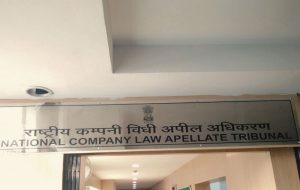National Company Law Appellate Tribunal (NCLAT): A Bench of Justice S.J. Mukhopadhaya, Chairperson, and Justice Bansi Lal Bhat, Member (Judicial), dismissed the interlocutory application preferred by the Registrar of Companies, Mumbai, seeking amendment of the NCLAT’s Judgment dated 18-12-2019 (“earlier judgment”) wherein the removal of Cyrus Mistry from the Chairmanship of Tata Sons was held invalid and conversion of TATA Sons Ltd. from Public Company to Private Company was also held invalid. The Registrar was aggrieved by the observations made at paras 181, 186 and 187 of the earlier judgment.
The Registrar of Companies, Mumbai, while making the order of the change of status of Tata Sons from Public Company to Private Company, relied on Section 43-A(2-A) of the Companies Act of 1956, which was unrepealed t the relevant time. The said provision provides:
“43-A. Private company to become a public company in certain cases.***
(2-A) Where a public company referred to in sub-section (2) becomes a private company on or after the commencement of the Companies (Amendment) Act, 2000, such company shall inform the Registrar that it has become a private company and thereupon the Registrar shall substitute the word `private company’ for the word `public company’ in the name of the company upon the register and shall also make the necessary alterations in the certificate of incorporation issued to the company and in its memorandum of association within four weeks from the date of application made by the company.”
However, noted the NCLAT,sub-section (4) of Section 43-A was not noticed by the Registrar, which says:
“43-A. Private company to become a public company in certain cases.***
“(4) A private company that has become a public company by virtue of this section shall continue to be a public company until it has, with the approval of the Central Government and in accordance with the provisions of this Act, again become a private company.”
Perusing these provisions, the NCLAT explained that Registrar of Companies cannot take advantage of Section 43-A (2-A) on the ground that it has not been repealed because:
“Section 43-A (2A) while empowers a ‘Public Company’ to become a private Company’ on or after commencement of the Companies(Amendment) Act, 2000 by informing the matter to the Registrar for substitution of the word ‘private company’ with the word ‘public company’ in the name of the company upon the register and certificate of incorporation issued to the company and its memorandum of association but under Section 43A (4) such ‘private company’ which has been made public company by virtue of the said provision, will continue to be a public company’ until it has, with the approval of the Central Government and in accordance with the provisions of the said Act, again become a ‘private company’.”
The NCLAT noted that since Tata Sons did not take any approval from the Central Government, as mentioned above, so it shall continue to be a Public Company.
Furthermore, it was not the case of the Registrar that as per Section 14 (alteration of articles) of the Companies Act, 2013, Tata Sons by a special resolution altered its article having the effect of its conversion from a Public Company into a Private Company. It was also not the case of the Registrar that such resolution was produced before it. No approval was taken from the Tribunal (NCLT). It was also noted that Section 18 of the Companies Act, 2013, specifically refers to the conversion of companies already registered.
Thus, there being a specific provision for conversion of companies already registered in terms of Section 18 of the Companies Act, 2013 and alteration of articles in terms of Section 14, the Registrar of Companies could not rely on Section 43-A (2A) of 1956 Act that too without relying on sub-section (4) therein which relates to requirement of approval of the Central government.
Lastly, one of the grievances of the Registrar of Companies was that the observations made in paras 181, 186, 187 of the earlier Judgment cast aspersions on the Registrar of Companies.
On this, the NCLAT found that this was a wrong perception of the Registrar of Companies as no observation had been made against the Registrar of Companies, Mumbai, not anything alleged against him.
Therefore, no ground is made out to amend the Judgment dated 18-12-2019 in the absence of any factual or legal error apparent on the body of the aforesaid Judgment. There is a typographical error at Paragraph 171 wherein un-amended Section 2(68) has wrongly been typed which has been ordered to be corrected. [Cyrus Investments (P) Ltd. v. Tata Sons Ltd., 2020 SCC OnLine NCLAT 1, decided on 06-01-2020]

